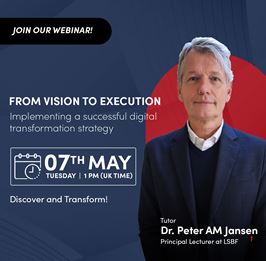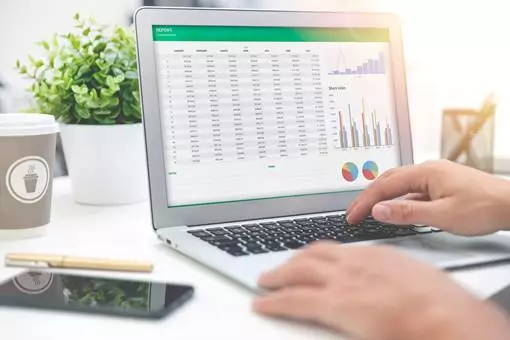How are accountants bridging the gap between data science and business?
- 7th October 2020
- Written by LSBF Staff
- Opinion & Features

Although data science is relatively new, the techniques and methods pioneered in the field are having a significant impact on the modern world. Drawing insights from big data has allowed many businesses to learn more about their customer base, develop new innovations and make predictions for the future. To emphasise just how big the field is becoming, a market research report released earlier this year predicted the big data market would grow from $138.9 billion in 2020 to $229.4 billion by 2025 showing that data science is here to stay. But how can data science skills be used within the accountancy field?
What is data science?
Data science is a new field which involves looking at big data sets and drawing insights from them. Using both statistical methods and tools, data scientists are able to interpret data, assess the accuracy of it and identify patterns and trends. Being a data scientist involves having a good knowledge of math, statistics, data engineering and computing. Using this knowledge, data scientists will be able to manipulate a dataset to create predictive outcomes.
For example, a data scientist working at Netflix might be able to analyse your viewing habits to create a set of recommendations of other programmes or films to watch. Alternatively, a data scientist working in a bank might be able to detect fraud on an account by analysing transactions and looking for anomalies.
How can data science skills be used in the field of accountancy?
The ICAEW (Institute of Chartered Accountants in England and Wales) predicts that the roles of accountants and data scientists are likely to become blurred over the next five to ten years. As data science is an emerging discipline, the financial sector is still learning how this newfound field can be used.
However, some organisations have already started to implement the tools and techniques used in data science. One example was shown in a 2018 client survey released by financial services firm Rehmann. The survey showed that the top reason for clients choosing Rehmann, above others, was that clients felt the company had an excellent understanding of their businesses. Using data analytics, the firm was able to analyse how specific legislation would impact their clients and start work prior to its implementation. As a result, clients were happier, and work was completed ahead of time.
Additionally, data science can allow accountants to make better predictions for the future. This might be predictions about the way legislation will impact a client or what sort of profit a business is likely to see at the end of the year. Alternatively, accountancy firms might be able to make predictions about the time commitments needed on a piece of work or how likely a client is to pay their bill on time. Using this data, accountancy firms will be able to perform their work more efficiently and effectively. They’ll also be able to make better business decisions based on insights from the data they have gathered.
Why is data science important in accountancy?
Data science can yield a significant number of benefits for the fields of accounting and finance. Accuracy and efficiency are just two aspects of a business that might be improved by introducing data science skills.
Growing digitalisation has reduced the amount of manual calculations completed by accountants. The introduction of software such as Alphatax, CCH and Xero has meant more automated calculations are being done resulting in a decrease in the amount of errors made. Automation has also contributed to this decrease. Rather than having accountants manually inputting data which might cause inaccuracies, automated processes such as updating tax codes have been implemented.
Data science skills can also save time for accountants. Knowing how to manipulate and use data to predict outcomes can give accountants a good idea of whether a bit of work is worth doing. For example, many accountancy firms will have private tax clients whose affairs will be impacted by different taxation legislation. If accountants can use data to predict how new legislation might impact a client, this can be beneficial for both the client in terms of making savings and in terms of the accountants who will have a good idea of work that might need performing well in advance.
What can we expect in the future?
Data science is likely to become increasingly merged with the accountancy profession due to the number of benefits it provides. From increased accuracy to providing accountants with more time to complete other tasks, data science will change the landscape of the field.
Data scientists are likely to become an integral part of accountancy firms. Whilst accountants might be able to use data science skills, they may not have all the knowledge of the field that they need to utilise it sufficiently. Therefore, data scientists will be brought into firms to implement data science techniques so that companies can get the most out what they collect. Data scientists will also have to consider the ethicality of the data collected and consider the challenges posed by mining such a large amount of data. This might mean the creation of new roles and therefore new jobs in the field.
Looking for a way to integrate data science into your future accounting career? London School of Business and Finance (LSBF) is offering ACCA students the chance to develop their skills with a free Data Science course worth £1,790. All students need to do is purchase any four ACCA courses with LSBF. To learn more, click here.
Other Opinions and Features
The Rise of Mobile Accounting
Accounting has always been a field that’s associated with piles of paperwork, spreadsheet and staggering numbers. Using computers to carry…
What will the role of the CFO look like in the future?
The CFO role is often thought of as being largely preoccupied with numbers and data, but in the last few…
7 Myths About Accountancy
Wondering what accountancy is really like as a career? Many people think that being an accountant is just number crunching…



